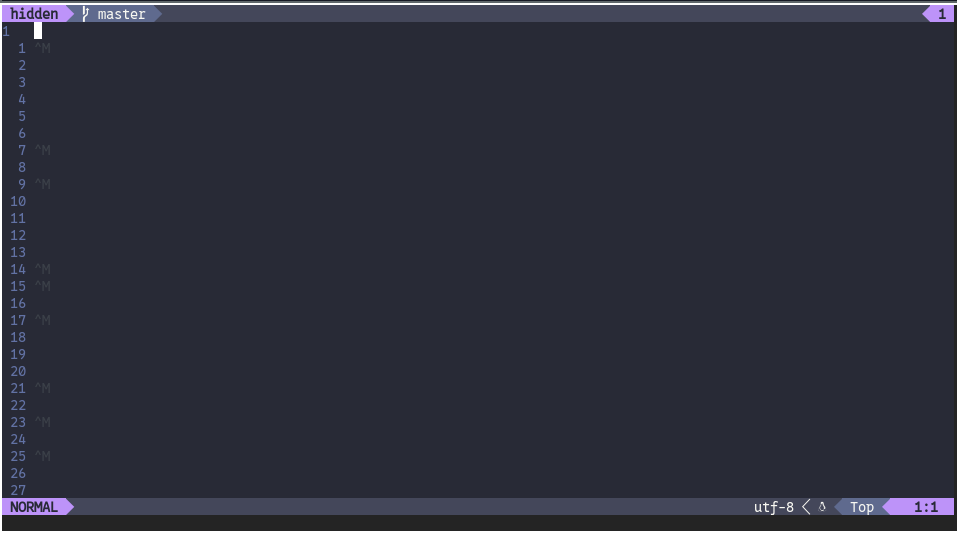Another Reading between the Lines?
Question: Is this another one of those hidden in plain sight typical normie challenges? Answer: No.
This challenge is very simple, here you have a file named hidden and all you need to do is get the flag. My focus for this year's CTF is not just the beginning but also ending on a high note, I won't rely on overused "read between the line" challenges and would rather have you guys do some research.
Good Luck!
Attachment: hidden
Solution
Ran file on the attachment
hidden: ASCII text, with CRLF, LF line terminators
Seems to be an ASCII file with mixed line terminators.
Luckily, neovim immediately gave away what this was

Those ^M are what we were looking for, DOS Line endings in a Unix file.
00000000: 0a0d 0a0a 0a0a 0a0a 0d0a 0a0d 0a0a 0a0a ................
00000010: 0a0d 0a0d 0a0a 0d0a 0a0a 0a0d 0a0a 0d0a ................
00000020: 0a0d 0a0a 0a0a 0a0d 0a0d 0a0a 0d0a 0a0d ................
00000030: 0a0a 0d0a 0a0a 0a0d 0a0a 0a0a 0d0a 0d0a ................
00000040: 0a0a 0d0a 0d0a 0d0a 0d0a 0a0d 0a0d 0a0a ................
00000050: 0d0a 0d0a 0a0d 0a0d 0a0d 0a0a 0a0a 0d0a ................
00000060: 0d0a 0a0a 0a0a 0a0d 0a0a 0d0a 0d0a 0d0a ................
00000070: 0d0a 0d0a 0a0d 0a0d 0a0d 0a0a 0a0d 0a0a ................
00000080: 0a0a 0d0a 0d0a 0a0a 0d0a 0d0a 0a0a 0d0a ................
00000090: 0d0a 0a0d 0a0a 0a0a 0d0a 0d0a 0a0a 0d0a ................
A simple script to treat 0a as 0 and 0a0d as 1
#!/usr/bin/env python3
file = open("hidden", "rb")
output = open("line.bin", "wb")
content = file.read()
content = content.replace(b"\r\n", (1).to_bytes(1, byteorder="big"))
content = content.replace(b"\n", (0).to_bytes(1, byteorder="big"))
chunk_size = 8
content = [content[i:i+chunk_size] for i in range(0, len(content), chunk_size)]
for byte_str in content:
current_byte = 0
for byte_char in byte_str:
current_byte = current_byte << 1
current_byte = current_byte | byte_char
output.write(current_byte.to_bytes(1, byteorder="big"))
this gave the output:
ACECTF{n0_r34d1n6_be7w33n_7h3_l1n35}